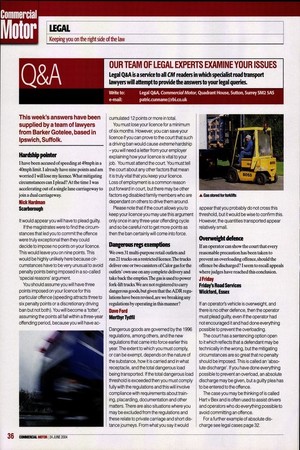OUR TEAM OF LEGAL EXPERTS EXAMINE YOUR ISSUES
Page 38

If you've noticed an error in this article please click here to report it so we can fix it.
Legal Q&A is a service to all CM readers in which specialist road transport lawyers will attempt to provide the answers to your legal queries.
This week's answers have been supplied by a team of lawyers from Barker Gotelee, based in Ipswich, Suffolk. Hardship pointer
I have been accused of speeding at 49mph in a 40mph limit. I already have nine points and am worried I will lose my licence. What mitigating circumstances can I plead? At the time I was accelerating out of a single lane carriageway to join a dual carriageway. Nick Hardman Scarborough
It would appear you will have to plead guilty.
If the magistrates were to find the circumstances that led you to commit the offence were truly exceptional then they could decide to impose no points on your licence. This would leave you on nine points. This would be highly unlikely here because circumstances have to be very unusual to avoid penalty points being imposed in a so-called 'special reasons' argument. You should assume you will have three points imposed on your licence for this particular offence (speeding attracts three to six penalty points or a discretionary driving ban but not both). You will become a 'totter', assuming the points all fall within a three-year offending period, because you will have ac
cumulated 12 points or more in total.
You must lose your licence for a minimum of six months. However, you can save your licence if you can prove to the court that such a driving ban would cause extreme hardship you will need a letter from your employer explaining how your licence is vital to your job. You must attend the court. You must tell the court about any other factors that mean it is truly vital that you keep your licence. Loss of employment is a common reason put forward in court, but there may be other factors eg disabled family members who are dependant on others to drive them around.
Please note that if the court allows you to keep your licence you may use this argument only once in any three-year offending cycle and so be careful not to get more points as then the ban certainly will come into force. Dangerous regs exemptions
We own 31 multi-purpose retail outlets and run 21 trucks on a restricted licence.The trucks deliver one or two canisters of Calor gas for the outlets' own use on any complete delivery and take back the empties.The gas is used to power fork-lift trucks.We are not registered to carry dangerous goods, but given that the ADR regulations have been revised, are we breaking any regulations by operating in this manner'? Dave Ford Merthyr Tydfil Dangerous goods are governed by the 1996 regulations, among others, and the new regulations that came into force earlier this year. The extent to which you must comply, or can be exempt, depends on the nature of the substance, how it is carried and in what receptacle, and the total dangerous load being transported. If the total dangerous load threshold is exceeded then you must comply fully with the regulations and this will involve compliance with requirements about training, placarding, documentation and other matters. There are also situations where you may be excluded from the regulations and these relate to private carriage and short distance journeys. From what you say it would
appear that you probably do not cross this threshold, but it would be wise to confirm this. However, the quantities transported appear relatively small. ()vowel& defence
If an operator can show the court that every reasonable precaution has been taken to prevent an overloading offence, should the offence be discharged? I seem to recall appeals where judges have reached this conclusion. J Friday Friday's Road Services Wickford, Essex
If an operator's vehicle is overweight, and there is no other defence, then the operator must plead guilty, even if the operator had not encouraged it and had done everything possible to prevent the overloading.
The court has a sentencing option open to it which reflects that a defendant may be technically in the wrong, but the mitigating circumstances are so great that no penalty should be imposed. This is called an 'absolute discharge'. If you have done everything possible to prevent an overload, an absolute discharge may be given, but a guilty plea has to be entered to the offence.
The case you may be thinking of is called Hart v Bex and is often used to assist drivers and operators who do everything possible to avoid committing an offence.
For a further example of absolute discharge see legal cases page 32.


































































































































































































